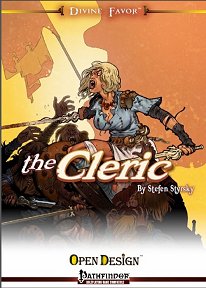
In what has become the standard opening, this fourth volume in the Divine Favour series opens with an overview of the cleric as adventurer and party member: strengths and weaknesses of the basic class, and what it's best to focus on. Most groups regard their cleric primarily as the provider of healing, with other spellcasting and a bit of combat tacked on for good measure. However, wise choice of offensive spells can make the cleric more potent in combat, and can be a better use of his powers than as a field medic. Switch to using the channel energy ability as the main healing force, and capitalise on the fact that clerics can cast spells when wearing heavy armour.
Next, new clerical domains are introduced: Alchemy, Apocalypse, and Prophecy; along with sub-domains that can be used to introduce variety by letting you swap out some of the domain powers and spells for different ones, changing the focus of your domain subtly. Some group existing spells to provide a different emphasis, but there are quite a few new spells - and new powers to play with.
If that's not enough, next some new archetypes. The Ascetic believes that the best way to explore his faith is to deny his bodily needs, fasting and choosing a limited diet, avoiding substances that he views as harmful. Charismatics exert influence over others by the power of their voices, many are travelling preachers proclaiming The Truth as they see it, some start crusades or urge their congregations to a certain course of action. An Enthusiast is filled with, well, enthusiasm about his faith and his deity - often forgetting themselves to such an extent that they can fall into a holy rage, abandoning reason as a raging barbarian does in his passion. The downside is that he cannot muster the focus to study spellcasting. The Exorcist sees devils and demons as threats to eliminate whenever the opportunity arises, and his powers and spells all function to that end. A Flagellant holds that pain and suffering are the way to salvation - and powers his spellcasting through his own blood. The Theosophist seeks wisdom and knowledge of the divine through study, becoming an intellectual student of his chosen faith rather than a devotee. They spend too much time in the library to be good fighters, on the other hand they have access to three domains instead of the regular pair, the third being any available to the character rather than those associated with his chosen deity. Vatics, who are restricted to the Prophecy domain alone, are capable of focussed visions, being able to cast any divine or arcane divinatory spell. Weapon-sworn believe that the path of righeousness is found through mastering their chosen weapon. Some are effective, even enthusiastic brawlers, others seek a more meditative state through their exercises. Wonder Workers manifest awesome powers through devotion alone.
Finally, all the new spells listed earlier are given a full write-up, ready for use; including a couple of rather nifty luck-based spells that can be used to help or hinder someone else.
There's a lot packed in here, and you will need to think what will fit in with the deities of your campaign world and the flavour of your game. Plenty of interesting ideas and food for thought, but as the deities of a world influence it so profoundly, GMs will need to decide which of these options to allow. The real strengths are the archetypes, which reflect how different people can take wholly different approaches to the service of their chosen deity - even when they have chosen to venerate the same one!
Return to Divine Favour: The Cleric page.
Reviewed: 4 October 2011

